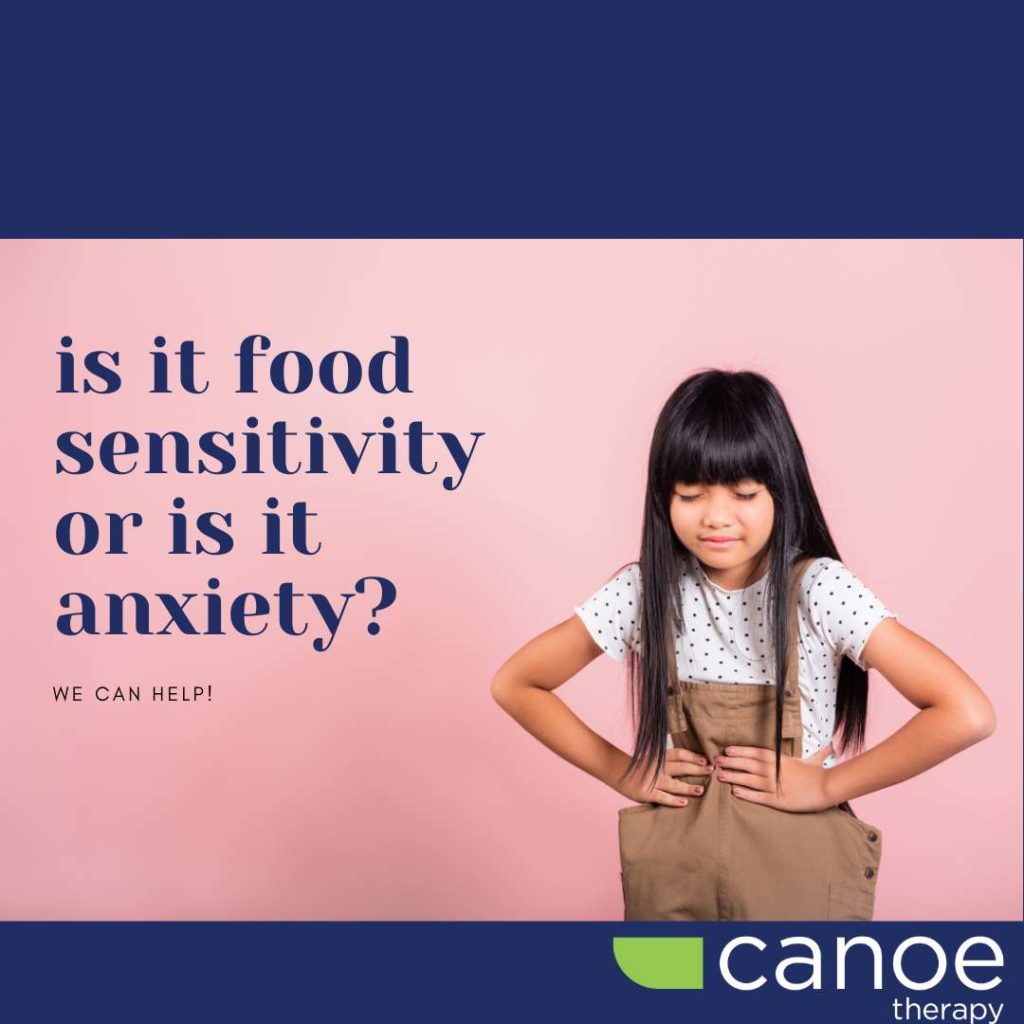Is it Food Sensitivity or Anxiety?
Does your child get a lot of stomach aches? Do they often feel unwell and have an upset tummy? Rightfully, many parents start with the family doctor and then may get referred to a specialist that orders tests for celiac or food sensitivities. And while that is important to rule out, many parents are told in the end that it is anxiety and that ‘structurally’ their child is healthy. So now what? First, lets understand how a stomach ache is related to anxiety.

Anxiety triggers our flight-flight response. Deep in the brain, your child may be thinking of the upcoming math test or a friend they are on the outs with and the thoughts and values associated with them trigger that primitive part of the brain to think there is danger. Once the brain thinks there is danger, the fight-flight alarm is tripped and the body starts the chain of commands to ‘keep it safe’. One of the commands in fight or flight is to release more stomach acid so that excess food moves out of the stomach.
Historically, the only danger humans experienced was physical and so they needed to either fight or run away from the danger, therefore the survival response to danger is a physical readiness to exert itself. But now in modern times, the fight-flight alarm is triggered by thoughts of events that get misinterpreted by the primitive brain to be dangerous and no physical response is needed. And so the acid collects in the stomach from thinking of things your child ‘fears’ and is thinking about, leaving them to feel sick.
But it is important to add that just telling kids, ‘You are fine, you are not sick, just go and write the test, don’t worry about it’ does not help. If this pattern is happening in your home, counselling can be very effective to help break down the cycle and to help your child reflect and understand how their thoughts are causing the panic.

Understanding the link of how their stomachaches are related to their thoughts is empowering, and that if they change their thoughts, or at least become aware of them, they can reduce the sick feelings. Anxiety does not tend to go away on its own, it is a pattern of thoughts that needs to be broken down.
We can help. Please contact us today for a consult.
In the meantime, here are some things to think about:
Helping children understand the connection between their thoughts and physical sensations, such as stomachaches, is crucial for empowering them to manage anxiety. Here are some tips to expand on this concept:
Use Child-Friendly Language:
- Explain the concept of thoughts and feelings using language appropriate for their age. Use simple and relatable examples to help them understand how thoughts can influence their body.
Create a Feelings Chart:
- Develop a visual aid like a feelings chart with various emoticons or drawings that represent different emotions. Encourage the child to point to or express how they feel when discussing their thoughts.
Storytelling and Imaginary Play:
Utilize storytelling or imaginary play to illustrate the connection between thoughts and physical reactions. Create characters or scenarios that mirror the child’s experiences and discuss how changing thoughts can lead to different outcomes.
Teach the “But” Technique:
- Introduce a simple cognitive restructuring technique. When a negative thought arises, teach them to add a “but” statement to challenge or reframe the thought. For example, “I feel nervous about the test, but I studied and can do my best.”
Explore and Label Emotions:
- Help children identify and label their emotions. Use emotion cards, drawings, or stories to illustrate different feelings. This enhances their emotional vocabulary and self-awareness.
Normalize Anxiety:
- Let children know that feeling anxious is a normal part of life. Explain that everyone experiences anxiety, but it’s how we manage it that makes a difference. This helps reduce the stigma associated with anxiety.
Encourage Open Communication:
- Create a safe space for children to express their thoughts and feelings. Encourage open communication without judgment. This can be achieved through regular check-ins or conversations during low-stress times.
Implement Relaxation Techniques:
- Teach simple relaxation techniques suitable for children, such as deep breathing exercises, guided imagery, or progressive muscle relaxation. Practice these techniques together during calm moments.
Use Creative Outlets:
- Foster expression through creative outlets like drawing, writing, or role-playing. This allows children to externalize their thoughts and emotions in a way that feels comfortable for them.
Set Realistic Expectations:
- Discuss the importance of setting realistic expectations for themselves. Help them understand that it’s okay not to be perfect and that making mistakes is a part of learning and growing.
Involve Parents and Caregivers:
- Work collaboratively with parents and caregivers to reinforce these concepts at home. Provide resources or activities that can be done together to support the child’s understanding and coping skills.
Reward Positive Coping:
- Reinforce positive coping behaviors by acknowledging and rewarding the child when they successfully manage anxiety. This could be through verbal praise, a reward chart, or a small treat.
Seek Professional Guidance:
- If anxiety persists or significantly impacts the child’s well-being, consider involving a child psychologist or counselor with experience in working with children and anxiety.
By approaching the topic in a developmentally appropriate manner and providing practical tools, children can learn to recognize and manage their anxious thoughts, leading to a reduction in physical symptoms like stomachaches.